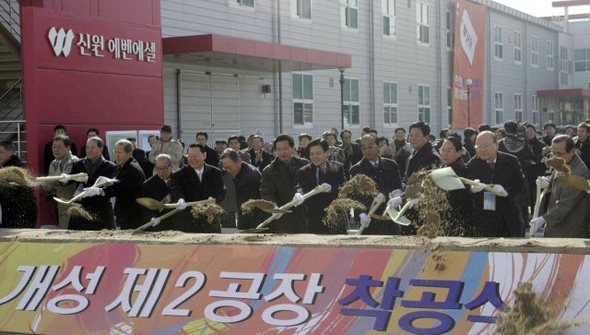 |
|
A groundbreaking ceremony was held on Feb. 9 for Shinwon Corporation's second factory in the Kaesong Industrial Complex, North Korea. Kaesong/Yonhap News.
|
When asked whether the 100 or so South Korean protesters reportedly traveling to Washington to protest the FTA will have any effect on the agreement negotiations, the official replied, "In a democratic society, citizens can express concern and raise complaint. But according to opinion polls conducted in South Korea, a majority strongly supports the FTA." Asked why the U.S. chose South Korea as its FTA partner, he said, "In fact, the U.S. didn’t select Korea. In a sense, South Korea selected the U.S. South Korea clarified an intention to push ahead with an FTA and expressed its will to have comprehensive negotiations. On the matter, Korea has attempted agricultural reform and hinted at the possibility of including ’sensitive’ items in the agenda." At the forum, Wendy Cutler, U.S. chief negotiator of the FTA talks between South Korea and the U.S., indicated that the U.S. administration is under strong pressure from various industries, citing, "The U.S. industries submitted far more complaints than in any other [FTA] negotiations." Ms. Cutler mentioned South Korea’s non-tariff trade barriers as factors which will hinder South Korea-U.S. negotiation. She seemed to stress that the deadline pushed by the so-called "fast track" faction in the U.S. administration is imminent, saying, "The South Korea-U.S. negotiation should be completed by the end of the year." Meanwhile, the Korea International Trade Association (KITA) and the U.S. National Association of Manufacturers (NAM) held a round-table discussion in Washington with participation of industrial representatives of the two countries, in which the group decided to back the FTA.





